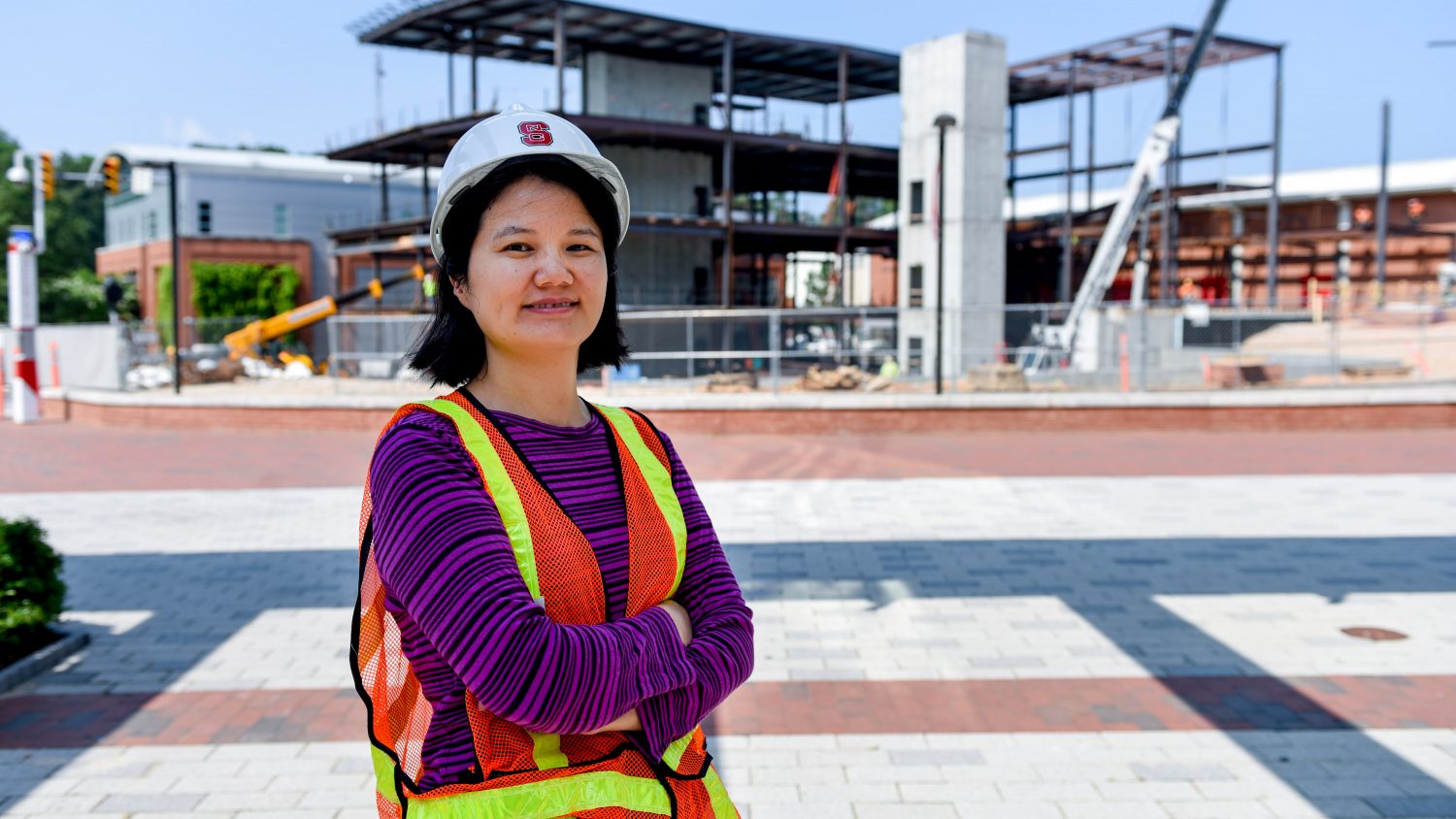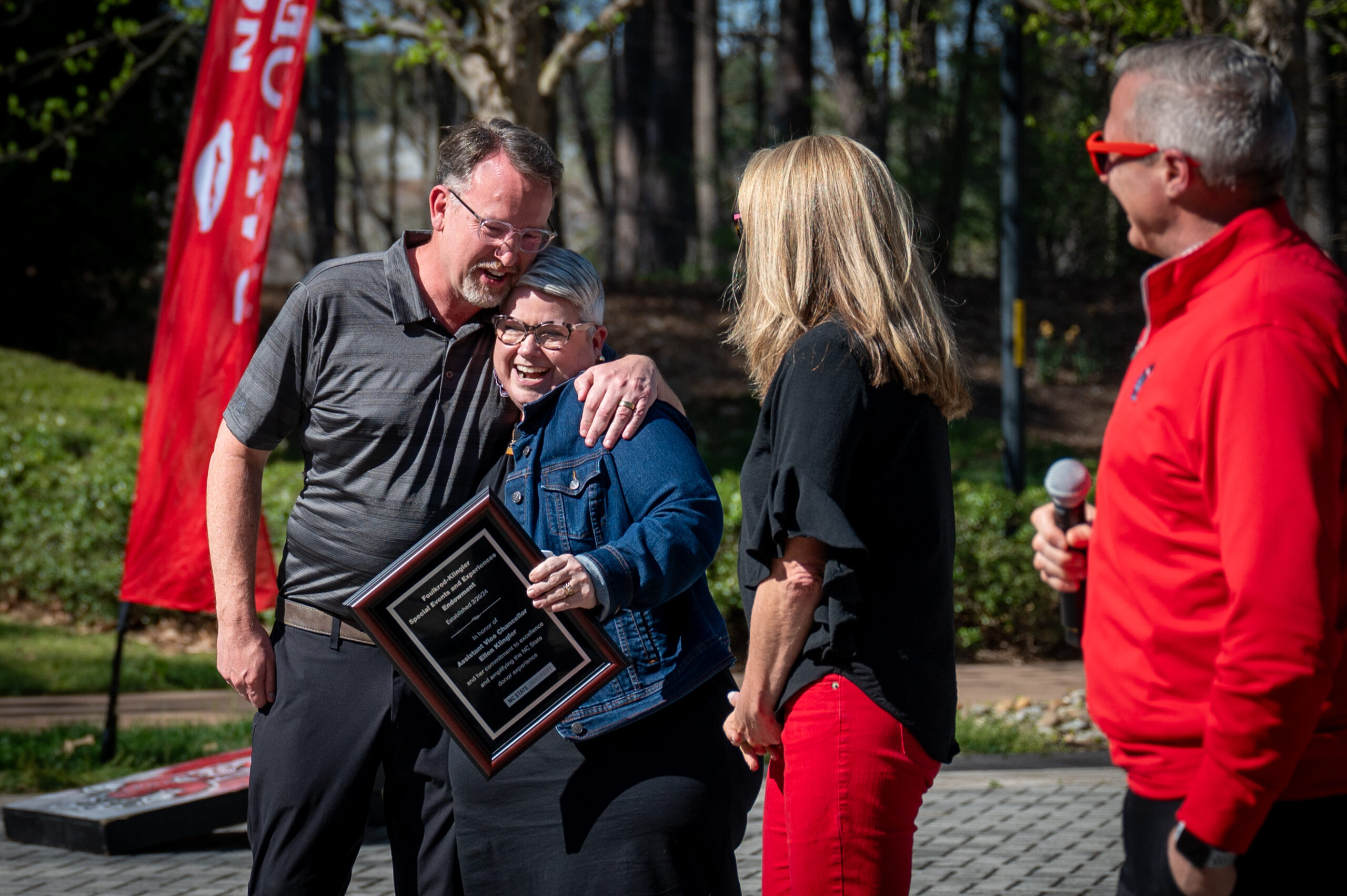Constructing More than Buildings

This story is part of the August 2019 Campaign newsletter. Continue reading to learn more about the extraordinary ways philanthropy transforms NC State.
Fitts-Woolard Hall will not open until 2020, but the building already has proved useful for Min Liu, associate professor and Edward I. Weisiger Distinguished Scholar, and her students in the Department of Civil, Construction and Environmental Engineering.
“It’s been a good place for us to collect data,” Liu said of the construction site on Centennial Campus. “I know the project manager, Mark Collins, from many years ago, when Engineering Building III was built. He has been very helpful, opening doors for my students for site visits and data collection.”
Building relationships like this has been a critical part of Liu’s success as a research adviser in construction engineering and management at NC State.
When she joined the College of Engineering faculty in 2007, after completing her Ph.D. in engineering project management at the University of California, Berkeley, she found that local construction practices differed from those on the West Coast.
Liu specializes in lean construction, which uses manufacturing principles to apply production management strategies to make construction more efficient. Plenty of San Francisco-area companies had implemented lean construction, but the practice hadn’t yet taken off on the East Coast – meaning there was limited data for Liu to collect or study.
When she called her mentor at Berkeley to express her frustration, he told her she couldn’t wait for people to give her the perfect data; she would have to make those connections.
Liu took the advice to heart, contacting experts from general contracting firms and consulting organizations. A small group met in Mann Hall to start a local lean construction chapter. Ten years later, the chapter has expanded to two locations, Charlotte and Raleigh, with monthly coffee meetings and bimonthly workshops or seminars.
Engineering an Efficient Plan
These collaborative meetings are just one way Liu shares her expertise beyond NC State. She is currently working on three research projects in partnership with the National Science Foundation of China, the United States Construction Industry Institute and the North Carolina Department of Transportation.
The first two projects focus on construction labor productivity.
Both involve surveys of manager attitudes and opinions about project delays and scheduling in order to develop more efficient practices.
“It’s important because on-site construction labor productivity has not improved over the past 50 years,” Liu explained. “We have new technology, we have new design programs, we have robots, we have drones, but at the end of the day, it’s people who make plans and put the doors and windows together.”
One potential way to increase productivity is collaborative scheduling, a method of production management that encourages collaboration among foremen of different trades involved in a construction project. Rather than taking a top-down approach, collaborative scheduling emphasizes empowering foremen, building trust and improving process transparency to increase plan reliability and labor productivity.
With the NCDOT, Liu is examining the formula that affects how funding for local road maintenance is allocated among more than 500 state municipalities. The current formula is based on mileage and permanent population, which can leave areas with large seasonal populations without sufficient funding to improve their streets. Liu and her team are researching approaches from other states and collaborating with the North Carolina Demographic Center to determine how to update the formulas.
“I am very lucky to have three funded projects,” Liu said. Because construction research is so practical, rather than theoretical, it does not typically attract a great deal of funding. This makes the Weisiger endowed faculty position, which she has held since 2014, even more important to Liu’s work – and to the graduate students she trains as part of her research.
Advising the Next Generation
Supporting graduate students, especially international ones, requires strong funding, and the Weisiger position has been a valuable resource. “If we don’t have this continuous pipeline of students, the research has to stop,” Liu explained. “The philosophy in our department is if you have students, that student is fully covered. He or she should focus on the work, not finances. Sometimes we have a very strong student we want to bring in for an upcoming project, and we could lose that student to another school.”
Liu is passionate about the role graduate students play in the future of construction engineering and views her students as the next generation of leaders. The impact she has had is evident in her office: A framed challenge coin – given by military-affiliated and veteran students to honor outstanding faculty, staff and administrators – from her first doctoral student, Brad Wambeke, hangs on the wall in front of her desk.
Wambeke is now a professor at the U.S. Military Academy at West Point. Other former doctoral students have found positions at institutions including the Air Force Academy and East Carolina University, and within general contracting firms.
“It’s important to continue to attract top graduate students so we can sustain our research for the future,” Liu said. “I can only have a direct impact on my students, but when they become professors, they impact more students. If those students realize the importance of doing research in construction, they will become the leaders in their companies and universities and can encourage more support like the Weisiger Distinguished Scholar position. It’s all a cycle.”
International Impact
In addition to her work at NC State and with the local lean construction group, Liu has established herself as a leader internationally. She is an associate editor and on the editorial board for the American Society of Civil Engineering (ASCE) Journal of Management in Engineering and an assistant editor specializing in labor issues for the ASCE Journal of Construction Engineering and Management.
And as of June, Liu is the vice chair of the ASCE’s Construction Research Council (CRC), a group of over 400 faculty members worldwide who hold doctorates in construction.
“I think the Weisiger title helped me because there are not many opportunities for endowed professorships for construction faculty,” she said of being elected to the role. “This makes my resume stand out.”
She views the position with CRC as something that raises the profile of both the university and the college, which can continue to attract research dollars and top students to the Department of Civil, Construction and Environmental Engineering.
With the diversity of specialties, collaborative spirit and academic strength of the department’s students and faculty like Liu and her colleagues, CCEE’s reputation continues to grow worldwide.
And as the Think and Do the Extraordinary Campaign continues to transform NC State’s physical campus, there is plenty of data for emerging construction leaders to study.
- Categories:


